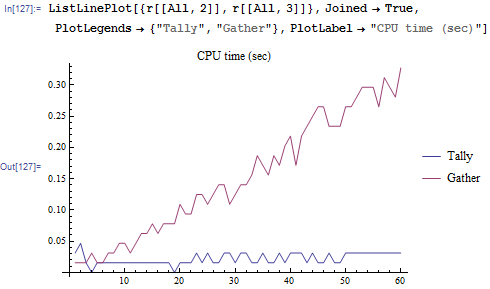SeedRandom[1];
yourList = RandomInteger[10000, 60000];
Pick[Keys[#], Values[#], 1] &@Counts[yourList]
(* {5966, 7867, 5862, 5476, 4417, 446, 971, 6670, 3464, 5600, 5429,
4649, 850, 7912, 6186, 6028, 1567, 7918, 6915, 8541, 4273, 5071,
2436, 9569, 8069, 3315, 3260, 2260, 2472, 1158, 8655, 2526, 8280,
9760, 5055, 404, 9398, 2787, 4347, 5772, 1989, 5910, 7944, 4030,
8199, 7206, 9212, 716, 3757, 7360, 8984, 5067, 7994, 5718, 7045,
3822, 2737, 8907, 502, 1968, 7669, 7673, 6120, 2729, 6801, 7136,
5000, 6306, 8508, 7839, 2026, 7875, 7368, 8385, 4127, 7745, 9691,
5284, 7607, 5964, 3504, 6701, 3433, 1910, 7754, 3969, 6592, 8153,
1503, 5955, 3374, 153, 1022, 6884, 3445, 6490, 4317, 8323, 4951,
3734, 8455, 3132, 2793, 9162, 7370, 4949, 2960, 7246, 8494, 1034,
5704, 7527, 6800, 1582, 1496, 9405, 6016, 2150, 2874, 9232, 6,
9862, 8743, 5682, 8578, 160, 8103, 9294, 8716, 7177, 4775, 7671,
7719, 1666, 1942, 6486, 1670, 7396, 1523, 2322, 2279, 1432, 1202,
9215, 3201, 9204, 2591, 3142, 6944, 9360, 2652, 4765, 9185, 3791,
5548, 8197, 5199} *}
A point-free version
Pick[Through[Sequence[Keys, Values][Counts[yourList]]], 1]
(* {5966, 7867, 5862, 5476, 4417, 446, 971, 6670, 3464, 5600, 5429,
4649, 850, 7912, 6186, 6028, 1567, 7918, 6915, 8541, 4273, 5071,
2436, 9569, 8069, 3315, 3260, 2260, 2472, 1158, 8655, 2526, 8280,
9760, 5055, 404, 9398, 2787, 4347, 5772, 1989, 5910, 7944, 4030,
8199, 7206, 9212, 716, 3757, 7360, 8984, 5067, 7994, 5718, 7045,
3822, 2737, 8907, 502, 1968, 7669, 7673, 6120, 2729, 6801, 7136,
5000, 6306, 8508, 7839, 2026, 7875, 7368, 8385, 4127, 7745, 9691,
5284, 7607, 5964, 3504, 6701, 3433, 1910, 7754, 3969, 6592, 8153,
1503, 5955, 3374, 153, 1022, 6884, 3445, 6490, 4317, 8323, 4951,
3734, 8455, 3132, 2793, 9162, 7370, 4949, 2960, 7246, 8494, 1034,
5704, 7527, 6800, 1582, 1496, 9405, 6016, 2150, 2874, 9232, 6,
9862, 8743, 5682, 8578, 160, 8103, 9294, 8716, 7177, 4775, 7671,
7719, 1666, 1942, 6486, 1670, 7396, 1523, 2322, 2279, 1432, 1202,
9215, 3201, 9204, 2591, 3142, 6944, 9360, 2652, 4765, 9185, 3791,
5548, 8197, 5199} *}


u = Union[lis]; Pick[u, Count[lis, #] & /@ u, 1];$\endgroup$unique()mathworks.com/help/matlab/ref/unique.html $\endgroup$Cases[Tally[yt], {a_, b_ /; b == 1} -> a]$\endgroup$